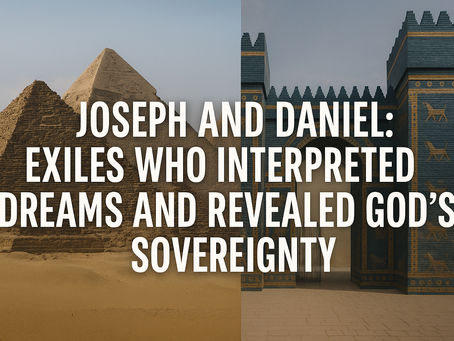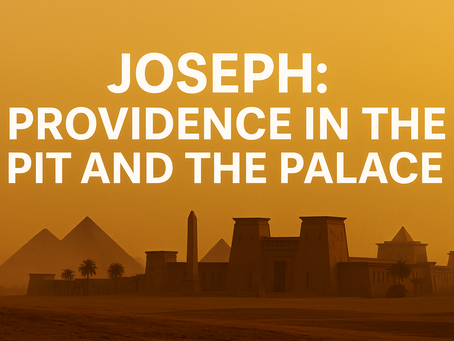top of page


Asenath: The Egyptian Wife of Joseph
Asenath: The Egyptian Wife of Joseph. Asenath is a quiet but significant figure in Joseph’s story. Though her words are never recorded, her marriage to Joseph symbolized the blending of Israel with Egypt and ensured the birth of two important tribes, Ephraim and Manasseh. She reminds us that God works through unlikely unions to bring about His plan.
3 min read


The Baker: The Servant Who Lost His Life
The Baker: The Servant Who Lost His Life. Pharaoh’s chief baker, alongside the cupbearer, plays a brief but dramatic role in Joseph’s prison years. His dream and its interpretation stand as a sobering contrast between restoration and judgment. The baker reminds us of the seriousness of sin and the certainty of God’s justice.
3 min read


The Cupbearer: The Servant Who Forgot Joseph
he Cupbearer: The Servant Who Forgot Joseph. Pharaoh’s chief cupbearer plays a brief but significant role in Joseph’s journey from prison to palace. Though his story is short, it demonstrates both the frailty of human memory and the faithfulness of God’s timing.
3 min read


Pharaoh: The King Who Exalted Joseph
Pharaoh: The King Who Exalted Joseph. Pharaoh, the unnamed king of Egypt during Joseph’s rise, played a decisive role in Israel’s history. By elevating Joseph from prisoner to ruler, Pharaoh became an instrument in God’s plan to preserve Jacob’s family during famine. Though a foreign monarch, his openness to Joseph’s wisdom contrasts with later pharaohs who opposed Israel.
3 min read


Potiphar’s Wife: The False Accuser of Joseph
Potiphar’s Wife: The False Accuser of Joseph. Potiphar’s wife stands as a figure of temptation, deceit, and false accusation. Though her name is not recorded, her actions are pivotal in Joseph’s story. She represents the destructive power of lust and lies, contrasting sharply with Joseph’s integrity.
3 min read


Potiphar: The Egyptian Officer Who Tested Joseph
Potiphar: The Egyptian Officer Who Tested Joseph. Potiphar stands as a figure of authority in Joseph’s story, an Egyptian officer whose household became the stage for both Joseph’s rise and his trial. Though not an Israelite, his role is crucial in shaping Joseph’s path toward exaltation in Egypt. Potiphar represents the power of the nations around Israel and the way God uses even foreign rulers to accomplish His purposes.
3 min read


Joseph and Daniel: Exiles Who Interpreted Dreams and Revealed God’s Sovereignty
Joseph and Daniel: Exiles Who Interpreted Dreams and Revealed God’s Sovereignty. Joseph and Daniel stand as two of Scripture’s most striking parallels. Both were young men uprooted from their homes and planted in foreign empires. Both suffered injustice, rose to prominence, and were entrusted with interpreting divine mysteries before the most powerful rulers of their day. Both bore witness that human kingdoms rise and fall, but God’s kingdom endures forever.
3 min read


The Bones of Joseph: Faith That Looks Forward
The Bones of Joseph: Faith That Looks Forward. Genesis closes not with triumph but with a coffin. After years of reconciliation, blessing, and Joseph’s exaltation in Egypt, the book ends with Joseph’s death and a peculiar request: that his bones not remain in Egypt but be carried to the Promised Land. This detail might seem small, but it points to one of the most profound themes in Scripture—faith that looks beyond death toward God’s promises.
3 min read


Forgiving Those Who Are Hard to Forgive
Forgiving Those Who Are Hard to Forgive. Forgiveness sounds noble until it touches the deepest wounds. It is one thing to forgive small offenses—unkind words, broken promises, or everyday irritations. But what about the unforgivable? What about betrayal by those closest to us, abuse, violence, even murder? The Bible does not shy away from these realities, and it offers a way of forgiveness that is neither shallow nor cheap.
3 min read


Joseph and His Brothers’ Reconciliation: The Theology of Forgiveness
Joseph and His Brothers’ Reconciliation: The Theology of Forgiveness. Genesis 42–45 brings the Joseph story to its emotional climax. The brothers who betrayed Joseph now stand before him in Egypt, unaware that the powerful governor is the brother they sold into slavery. What follows is a narrative of testing, repentance, and forgiveness that shows how God transforms guilt into grace.
2 min read


Joseph and Pharaoh: From Forgotten Prisoner to Exalted Ruler
Joseph and Pharaoh: From Forgotten Prisoner to Exalted Ruler. Genesis 41 records one of the most dramatic reversals in Scripture. Joseph, forgotten in prison for two years, is suddenly summoned before Pharaoh to interpret dreams that baffle Egypt’s wisest men. In a single day, the slave becomes second in command over the greatest empire of the time.
2 min read


Resisting Sexual Temptation: Lessons from Joseph and the New Testament
Resisting Sexual Temptation: Lessons from Joseph and the New Testament. Sexual temptation is not new. From ancient Egypt to the digital age, God’s people have faced the pull of desire, secrecy, and compromise. Joseph’s encounter with Potiphar’s wife (Genesis 39) stands as one of the most powerful examples of resisting temptation.
4 min read


Joseph in Potiphar’s House and Prison: Integrity Under Fire
Joseph in Potiphar’s House and Prison: Integrity Under Fire. If Genesis 37 shows Joseph’s betrayal by his brothers, Genesis 39–40 shows his testing in Egypt. Here the beloved son becomes the faithful servant, resisting temptation, enduring false accusation, and proving that God’s presence is not limited to circumstances.
2 min read


Joseph and His Brothers: Jealousy and Betrayal
Joseph and His Brothers: Jealousy and Betrayal. Genesis 37 begins the long narrative arc of Joseph, one of the most vivid characters in the Old Testament. This chapter sets the stage for everything that follows, exposing the fractures in Jacob’s family and the envy that drives Joseph’s brothers to betrayal.
3 min read


Manasseh: The Firstborn Son of Joseph
Manasseh: The Firstborn Son of Joseph. Manasseh’s story is often overshadowed by his younger brother Ephraim, yet his role in Israel’s history is significant. Born in Egypt to Joseph before the famine, Manasseh carried the honor of being the firstborn. Though Jacob gave greater blessing to Ephraim, Manasseh’s tribe still became one of the largest and most influential in Israel, demonstrating both strength and loyalty in battle.
3 min read


Ephraim: The Fruitful Son of Joseph
Ephraim: The Fruitful Son of Joseph. Ephraim’s story is one of prominence and paradox. As the younger son of Joseph, he received the greater blessing from Jacob, and his tribe became one of the most influential in Israel. Yet his legacy is also marked by idolatry and judgment. Ephraim represents both fruitfulness and failure, a reminder of the tension between God’s calling and human disobedience.
3 min read


Joseph: Providence in the Pit and the Palace
Joseph: Providence in the Pit and the Palace. Few biblical stories rival the sweep and depth of Joseph’s account (Genesis 37–50). It is a story of betrayal and providence, of human evil and divine sovereignty, of a favored son sold into slavery who becomes the savior of nations. More than moral lessons about integrity and forgiveness, Joseph’s story demonstrates that God’s purposes cannot be thwarted. What men mean for evil, God means for good.
3 min read


Joseph: The Dreamer Who Became a Savior
Joseph: The Dreamer Who Became a Savior. Joseph’s story is one of the most detailed and remarkable in Scripture. Born to Rachel, the beloved wife of Jacob, Joseph is remembered for his dreams, betrayal by his brothers, rise to power in Egypt, and ultimate role as a savior to his family. His life foreshadows Christ in profound ways, making him one of the clearest types of Jesus in the Old Testament.
3 min read
bottom of page